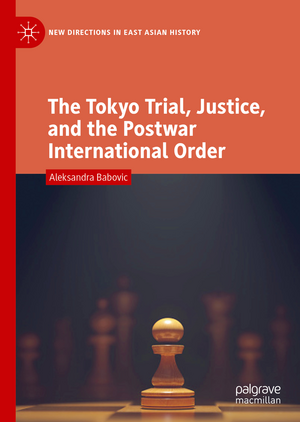The Tokyo Trial, Justice, and the Postwar International Order: New Directions in East Asian History
Autor Aleksandra Babovicen Limba Engleză Hardback – 16 ian 2019
Preț: 497.77 lei
Preț vechi: 585.62 lei
-15% Nou
Puncte Express: 747
Preț estimativ în valută:
95.25€ • 99.45$ • 78.83£
95.25€ • 99.45$ • 78.83£
Carte tipărită la comandă
Livrare economică 04-18 aprilie
Preluare comenzi: 021 569.72.76
Specificații
ISBN-13: 9789811334764
ISBN-10: 9811334765
Pagini: 168
Ilustrații: VI, 178 p.
Dimensiuni: 148 x 210 x 18 mm
Greutate: 0.38 kg
Ediția:1st ed. 2019
Editura: Springer Nature Singapore
Colecția Palgrave Macmillan
Seria New Directions in East Asian History
Locul publicării:Singapore, Singapore
ISBN-10: 9811334765
Pagini: 168
Ilustrații: VI, 178 p.
Dimensiuni: 148 x 210 x 18 mm
Greutate: 0.38 kg
Ediția:1st ed. 2019
Editura: Springer Nature Singapore
Colecția Palgrave Macmillan
Seria New Directions in East Asian History
Locul publicării:Singapore, Singapore
Cuprins
Part I.- 1. The Tokyo Tribunal, Justice, and International Order.- 2. In the Shadow of the Paris Peace Conference: Behind the Scene of the International Military Tribunal for the Far East.- 3. The IMTFE as a Venue for Legislating Process.- 4. The Hegemonic Narrative of the Pacific War: Japan’s Conspired and Aggressive War.- 5. The Partial Interest for Victims and Strategic “Forgetting” at the Tokyo Tribunal.- 6. Emperor Hirohito as the Japanese Kaiser and Selection of the IMTFE Defendants.- Part II.- 7. Towards the Post-Institutional Phase of the Tokyo Tribunal: Narratives, Sentences, Detentions.- 8. Forgiveness by Law and Dilemmas on the Nature of the War Criminal Program in Japan.- 9. Stagnation and Confusion: The Incoherencies of the War Criminal Program in Japan.- 10. From Criminals to Spirits: Class A War Criminals.- 11. International Criminal Tribunals: Cui Bono?.
Notă biografică
Aleksandra Babovic is Assistant Professor at Osaka University Graduate School of Human Sciences, Japan. She holds a PhD from Kobe University Graduate School of Law with a specialization in Diplomatic History and earned her MA degree from Paris School of International Affairs, Sciences Po (France). She is a lecturer at Kyoto University of Foreign Studies (Japan) and Osaka University (Japan). Her research interests include Japanese post-war history, international criminal law and justice, and more specifically the Tokyo Tribunal.
Textul de pe ultima copertă
Fully utilizing the latest archival material, this book provides a comprehensive, multi-dimensional and nuanced understanding of the Tokyo Tribunal by delving into the temporal aspects that extended the relevance and reverberations of the Tribunal beyond its end in 1948. With this as a backdrop, this book contributes to the study of Japanese postwar diplomacy. It shows the Tokyo Tribunal is still very much an experiment in progress, and how the process itself has helped Japan to quickly shed its imperial past and remain ambiguous as to its war responsibilities. From a wider vantage point, this book augments the existing scholarship of international criminal law and justice, offering a clear framework as to the limits of what international criminal tribunals can accomplish and offers a must-read for academics and students as well as for practitioners, journalists and policymakers interested in international criminal law and US-Japanese diplomatic history,
Caracteristici
Challenges the predominant view of the Tokyo Trial by observing it as a politico-legal event Offers a deep conceptualization of the Trial by using relevant disciplines, history and international criminal law Covers not only the Trial but also the temporal grid well beyond its end in 1948










